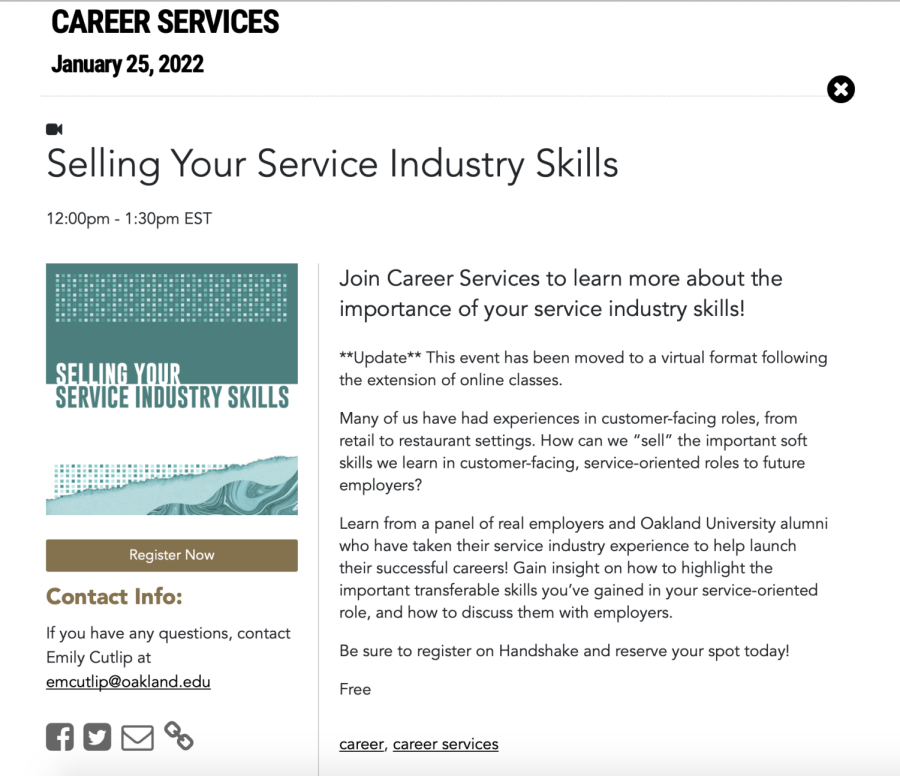“Selling Your Service Industry Skills” promotes value of service industry
The “Selling your Service Industry Skills” event took place on Jan. 25, and was presented by Career Services.
On Jan. 25, Oakland University Career Services hosted “Selling Your Service Industry Skills” — an event to promote the value of students’ service industry experiences. The event aimed to beat the stigma that jobs students may have in the service industry are not valuable on a resume or transferable to professional jobs.
Career Services invited employers who previously have worked in the service industry to discuss the benefits, and also gave students insight on how to highlight these service industry skillsets to employers.
“I think the concept that stuck out the most was that students need to be proud to put it on their resume,” Anne Holtvluwer, career consultant in Career Services, said. “You worked at this restaurant, and you learned so many skills. The things they learned ranged from customer service, multitasking, prioritizing, time management, selling, communication skills, leadership and the whole training bit.”
Leadership opportunities are abundant in service industry jobs. However, students may not realize all the skills they are gaining — especially leadership qualities when training people.
“People don’t realize those skills can’t be taught,” Holtvluwer said. “You have to learn them. The students [working] in these industries have learned invaluable skills, so that was the best part, I thought. We don’t even recognize how cool these jobs are.”
Employers shared what multidisciplinary skills they gained from their service industry experiences. These include: learning conversational skills, multitasking in a fast-paced environment, dealing with challenging customers, becoming efficient at time management and learning how to shake things off more easily.
There are plenty of misconceptions when it comes to students working in the service industry. The goal of this event was to give students an informed picture of the industry, and that its jobs are valuable and offer plenty of opportunities to enhance abilities.
“I definitely think it debunked myths because we had employers who have gone through the service industry themselves,” Emily Cutlip, career consultant in Career Services, said. “Not only were students hearing that from Career Services, but now they hear that from employers themselves. Specifically, employers who have gone through the service industry on their own career journey, so they could speak to it in a variety of ways.”
Cutlip hopes that students find value in the transferable skills they gained through the service industry, and have the confidence to talk about it.
“My hope is students gain confidence in their service industry background,” Cutlip said. “The service industry is something that I think a lot of students are initially ashamed of, or they feel like it doesn’t have any value. But my hope is students realize there’s so much value in these soft transferable skills that you gain in the service industry.”
Cutlip also shared there is a place for their skills, and a way to discuss those skills on a resume. It is valuable when students are able to sell the skills they have in interviews and mention them with recruiters.
“Again, things like communicating efficiently, working with difficult people, being able to work in teams, working under pressure,” Cutlip said. “I really feel like students walk away feeling the value of their skills and that there is a place for them. And there’s a way to talk about them on your resume. There’s a way to sell them in an interview. I think students walked away realizing it’s not something to shy away from when talking with a recruiter. It’s something you can celebrate and if you know how to speak to the skills you gained, it’s incredibly valuable.”
In service industry jobs, dealing with the public happens often, and according to Holtvluwer, communication is an important transferable skills.
“Probably the top for me would be communication,” Holtvluwer said. “They almost always deal with the public in one way or another. [With] that, you learn a lot, meet a lot of different people, and that’s priceless.”








